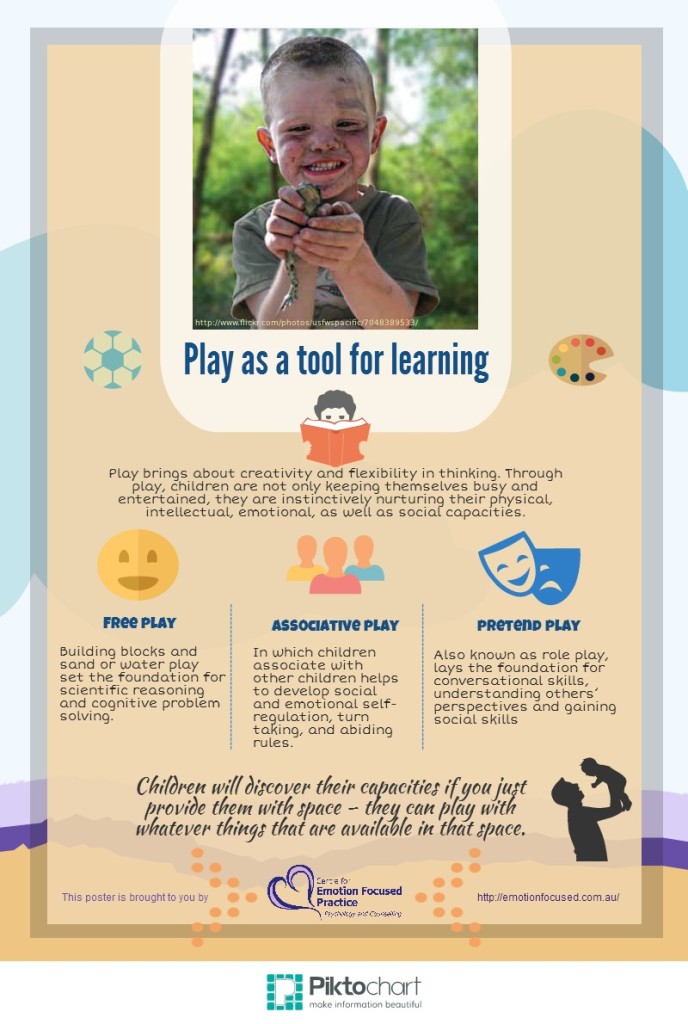Play as a Tool for Learning
Play brings about creativity and flexibility in thinking. Through play, children are not only keeping themselves busy and entertained, they are instinctively nurturing their physical, intellectual, emotional, as well as social capacities. No wonder then that developmental psychologists consider play as a tool for learning.
Jean Piaget, a famous Swiss developmental psychologist, was of the view that play is a “natural vehicle” for learning in children. It boosts every aspect of children’s development and learning. Play has been described as the window through which children view the world. The significance of play in children’s lives is even recognized by the United Nations as a specific right, distinguished from their right to recreation and leisure.
Types of Play and Why Each Is Important
In our current lifestyle, the value of play as a tool for learning is often overlooked. Parents and teachers alike, often label play as wastage of time and skills; while it is quite the contrary. Children possess a natural inclination to play; in fact, this is what the nature has intended for them to do. Children do not play with an intention to learn, yet they are learning while they indulge in playing activities. Play nurtures every facet of a child’s development—forming the basis of all skills necessary for success in school and in later life, and hence, “paving the way for learning”.
There are multiple types of play; such as, free or unstructured play, associative play, dramatic or role play. In each type of play, there are invaluable skills which progress as a consequence.
For instance, free play, such as building blocks and sand or water play, set the foundation for scientific reasoning and cognitive problem solving.
Similarly, associative play (in which children associate with other children) helps develop social and emotional self-regulation, turn taking, and abiding rules.
Pretend play, also known as dramatic play or role play, lays down the foundation for communication, conversational skills, understanding into others’ perspectives and most importantly social skills such as negotiating, compromising, the art of persuading, and cooperating. Such forms of play lead to feelings of competence and self-confidence in children and also the basis of understanding and identifying cultural and societal values.
Research Demonstrating Play as a Tool for Learning
Research findings have consistently shown ample evidence that increasing opportunities for symbolic or role play can have a positive influence on literacy development, as role play connects children in representational thinking similar to those required in early literacy activities. When children indulge in symbolic play, they begin to relate objects, actions, and language together and form descriptive sequences. Thus becoming able to produce language appropriate to different roles and perspectives.
A longitudinal study conducted by the University of North Carolina’s Abecedarian Early Child Intervention Program started in 1972 randomly distributed preschoolers to either a play-enriched preschool program or to a regular preschool program. The results of the study demonstrated that the children in the play enriched settings had notably higher IQs at five years of age than the control group. In addition, children from play-enriched settings have continued to maintain the lead; even thirty years later they are more likely to go to college and less likely to be unemployed than their play-deprived counterparts.
Another research by Steinkuehler demonstrated the value of play in learning. It was noted that boys who characteristically read several grades below level in school were found to read texts way above their grade level if the texts were part of online games. The results explained that if the boys could choose what they read, which they could do with online games, they pushed themselves harder. According to the researcher, “Games are architectures for engagement required in learning.”
Significance of Outdoor Play
In current times, the nature of play is evolving; play is becoming largely dependent on technology and concept of outdoor play is waning. Although advantages of technological play cannot be denied, outdoor play should not be ignored at its cost. While technological play may help children develop problem-solving, brain storming and critical thinking skills, it cannot replace the natural form of play.
Outdoor play exposes children to diverse and multi-sensory experiences – rough, uneven landscapes provide opportunities for the development of physical strength, coordination and balance. Boisterous, energetic, physically active play is impossible to accomplish through video games or on-line gaming. Outdoor play presents children with the opportunity of physical challenge and risk-taking. It offers natural elements which children can combine, manipulate, and utilize to their benefit. According to a play-expert, “Children will discover their capacities if you just provide them with space – they can play with whatever things that are available in that space.”
Recommendations for Parents, Teachers and School Administrators to Facilitate Children’s Play
It is essential that young children are provided with balanced opportunities for different kinds of play; indoors and outdoors. Parents, teachers, and school administration should recognize the need and importance of play and design the activities with the following aspects in mind.
- Children should be give long, uninterrupted periods of at least 45–60 minutes for spontaneous free play.
- They should be equipped with diverse materials to inspire different kinds of play. For example, blocks and construction toys for cognitive development, doll houses, dress-up clothes, dinkies and other props for pretend play; ropes, balls, hoops along with climbing places, and open space for gross motor play; mud, sand, water, clay, dough, paints, and similar open-ended materials for sensory play.
- Children should be encouraged to manipulate the environment to enhance their play.
- Children should be provided with opportunities for age-appropriate challenges and risk-taking in play.
- It is particularly important to recognize the value of messy play, unstructured play, and nonsense play; adults often object to this kind of play which hinders the development of many important skills.
- Children should be allowed to play for their own justifications; significant adults should take interest in their play – asking questions, making suggestions, and participating eagerly as co-players when invited, also adults should play with children on children’s terms.
Child Practitioners at the Centre
Mathew Gaynor is a practitioner at the centre who has experience in treating children.
To get an appointment or to make enquiries, please call (03) 9820-5577.





